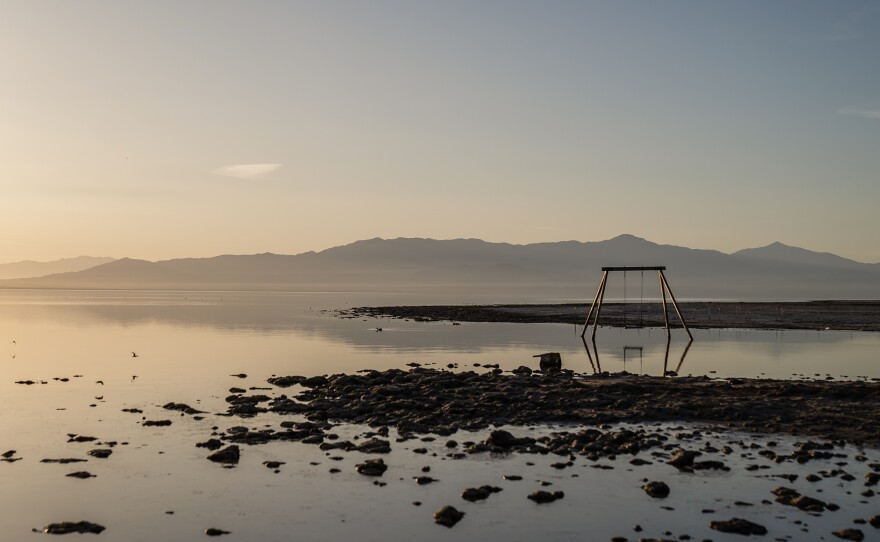An Imperial County judge cleared the way for the Hell’s Kitchen project, one of the world’s largest lithium mines, when he recently dismissed a lawsuit filed by civic and environmental groups.
Hell’s Kitchen, in the Salton Sea, promises to unearth a motherlode of lithium, a mineral essential to electric car batteries, cellphones and other electronics. While the court decision is expected to open a floodgate for U.S. lithium production, it has disappointed community organizers who worry the mine will endanger nearby residents.
The nonprofits Comite Civico del Valle and Earthworks argued in their lawsuit that the environmental review for Hell’s Kitchen did not fully address the project’s effects on water supply and air quality, and that the company developing it, Controlled Thermal Resources, didn’t consult with local Native American tribes as required by law. On Jan. 9 Superior Court Judge Jeffrey Jones ruled that Controlled Thermal Resources had met those requirements, freeing it to resume construction.
Opponents said that decision greenlights the project without sufficient environmental protection and community input.
“A just transition to renewable energy requires that we don’t create new sacrifice zones for lithium mining,” Jared Naimark, California mining organizer with Earthworks, said in a statement.
Rodney Colwell, CEO of Controlled Thermal Resources, said he is pleased with the decision and expects to start construction in five to six months. However, the lawsuit set the project back a year or more.
“We’re happy to get past it, but it has cost us a lot of time and it has put the project at risk,” he said. “We haven’t been able to raise capital. We haven’t been able to move forward with development at all.”
Now that it’s back on track, Colwell said the company expects to start generating geothermal energy by the end of 2026 and mining lithium after that.
California leaders are determined to transition the public to electric vehicles over the next decade as part of the state’s battle against climate change. To do that, they’ll need lots of lithium.
That’s where the Salton Sea and Hell’s Kitchen come in. Energy companies are already producing geothermal energy at the site, extracting hot, high-pressure brine to generate electricity. The brine is rich with minerals, including more than 3,400 kilotons of lithium: enough to make over 375 million electric vehicle batteries, according to the Department of Energy. Hell’s Kitchen will remove minerals from the brine and then reinject it into aquifers around the Salton Sea.
State and federal officials gushed about the prospect of that much domestic lithium, predicting that the area they call “Lithium Valley” could become one of the world’s biggest sources of the “white gold,” freeing the U.S. from depending on other countries for the critical mineral.
“The development in Imperial Valley is a gamechanger for not just Southern California but the entire nation in shifting lithium dependence on foreign countries to a domestic supply,” Controlled Thermal Resources stated in a press release.
But local organizers and academics raised a red flag, pointing to uncertainty about the extraction process and possible pollution.
“The direct lithium extraction technology that the Hell’s Kitchen Lithium Project plans to deploy has only been tested at a demonstration level, and their Imperial County project would be one of the first commercial plants of this scale in the United States,” said Luis Olmedo, Executive Director for Comite Civico del Valle, in a statement.
“It’s got a lot of unknowns in terms of air quality,” added James Blair, a geography professor at Cal Poly Pomona who published research on the project. “This is already a degraded region, not only from the impacts of agriculture, but also the receding Salton Sea itself.”
Blair told CalMatters the environmental review is fuzzy about how much toxic dust the mine would produce, how much water is needed to dilute the brine and whether the mining process would release harmful substances such as hydrogen sulfide or radon.
“The Hell’s Kitchen project can do much more to mitigate environmental impacts,” particularly on water shortages and drought, he said.
Colwell said those concerns are unfounded and described the lithium extraction process as a “closed-loop system” that won’t generate landfill waste or air pollution.
“It is the cleanest lithium technology on the planet,” he said.
Jones ruled that the company has adequately addressed the project’s effects on water supply and couldn’t analyze potential future air quality impact.
Olmedo said the court ruling doesn’t satisfy the nonprofits’ concerns. They want stronger water conservation measures, better protections for tribal resources and more details about waste generation and water recycling. They’re seeking a legal agreement between the company and Imperial Valley residents to ensure those demands are satisfied.
Olmedo said his organization “will exhaust all available legal and public policy channels, including consideration of appealing the trial decision, to ensure that the residents and environment of the Imperial Valley receive the highest threshold of protection.”
This article was originally published by CalMatters.







